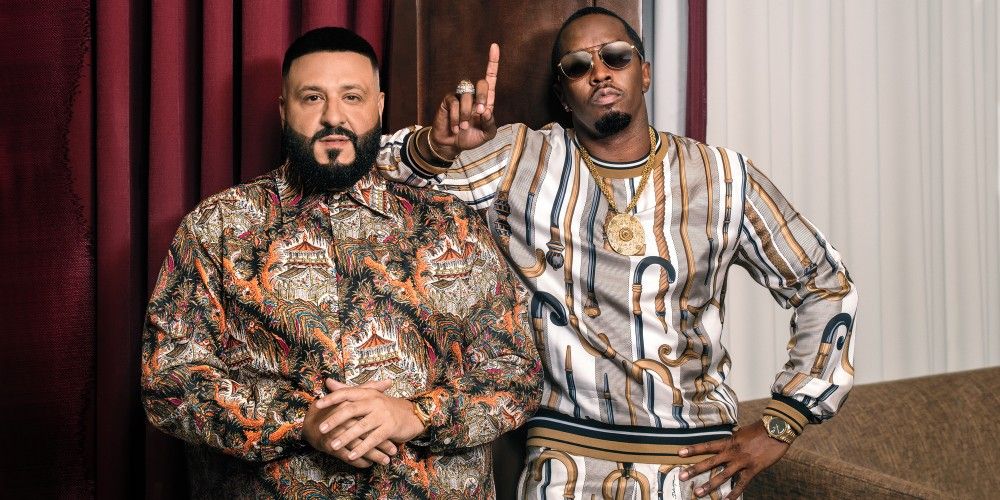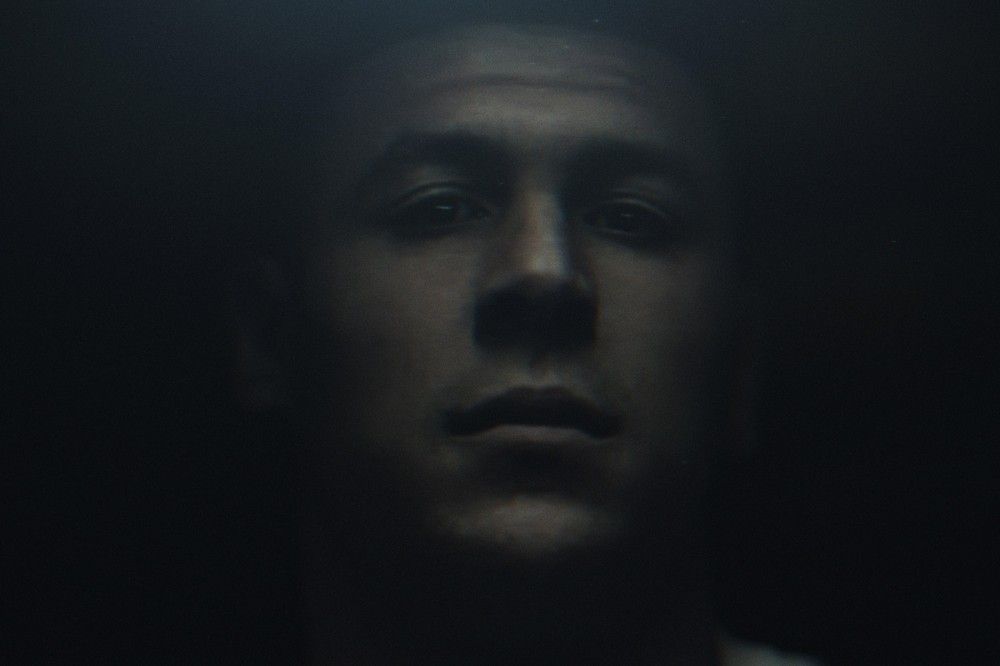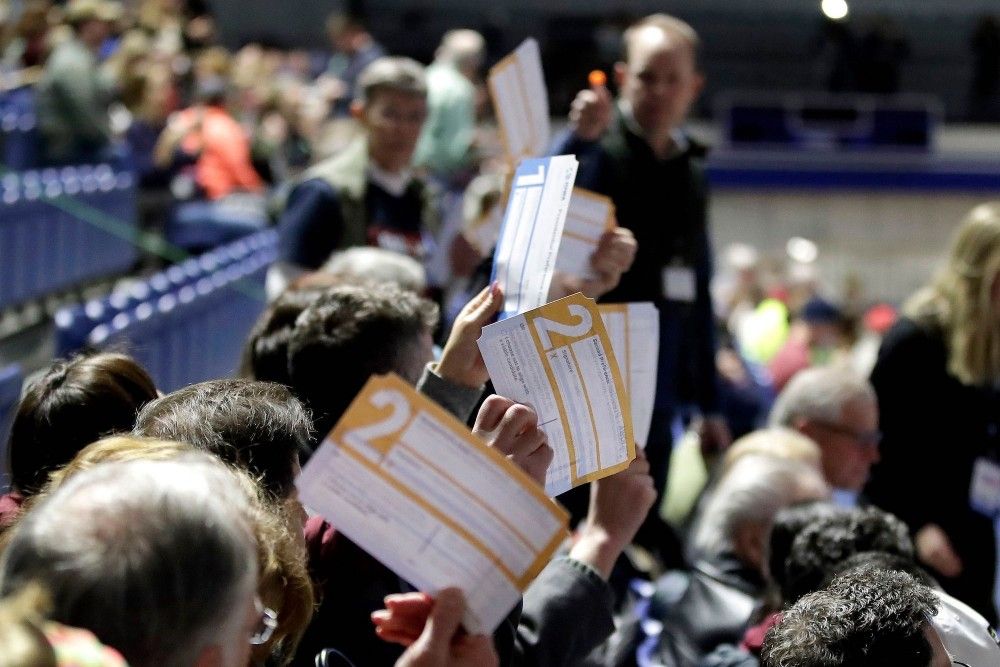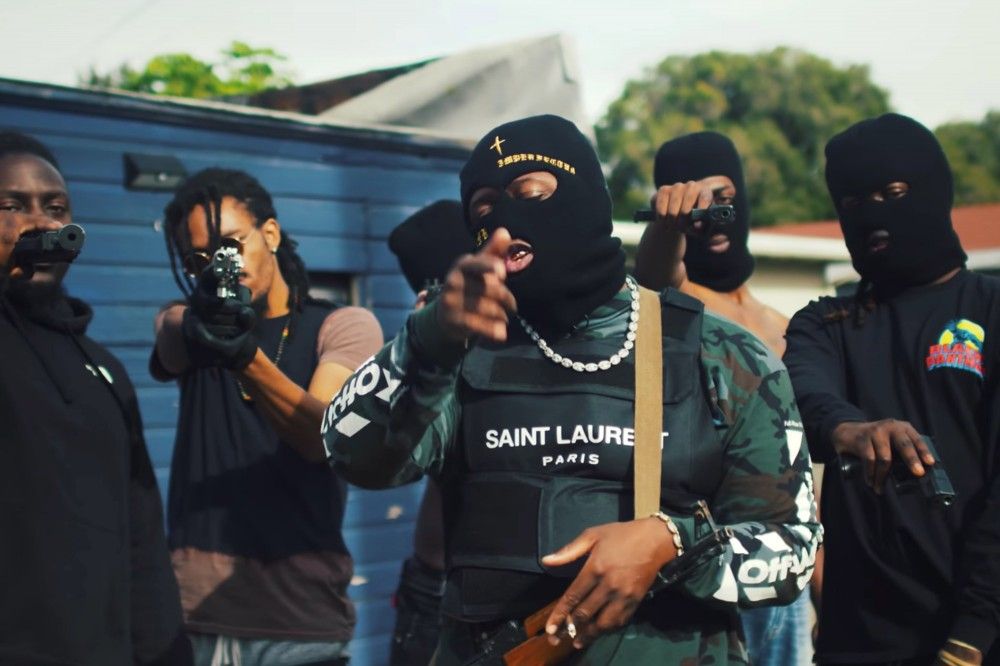
Musicians on Musicians: Diddy & DJ Khaled
In a suite at the Ritz Carlton in downtown Atlanta, Sean “Diddy” Combs instructs DJ Khaled to walk through a cloud of cologne. He’s creating a vibe, one that will carry the pair of hip-hop mega-producers into a 2 Chainz birthday party later. “I love being a rapper!” Diddy says at one point, completely unprompted.
The two have a long history together; Khaled first encountered Diddy in the Nineties when he was a new radio personality and Diddy was one of the most dominant figures in hip-hop, as an artist and the CEO of Bad Boy Records, the home of the Notorious B.I.G., Faith Evans, Mase, and more. Today, the rapper-producer-social media savant is the most obvious inheritor of Diddy’s unique mix of musical drive, omnidirectional marketing genius, and ecstatic self-promotion. “He’s the blueprint,” says Khaled, whose new album, Father of Asahd, features Travis Scott, Justin Bieber, Beyoncé, and others.
How did you two first meet?
KHALED I was street team. I don’t think Puff realized there was a street team for Bad Boy. Then after that, in Miami, me and Puff met while I was on the radio, breakin’ records, spinnin’ records. Met him through Fat] Joe. Met him through a lot of people. We just became real brothers.
DIDDY I can’t tell you about the first time I met him, the real truth. There was stipulations.
KHALED Yeah. Some stories gotta be untold.
DIDDY God is great. We don’t have to live that way anymore.
KHALED I wouldn’t be able to do a lot of the things I’m doing now if it wasn’t for Puff Daddy. When I got the opportunity to do Icon on Icon The two have renamed our “Musicians on Musicians” issue], it had to be Diddy. He’s one of my biggest inspirations. I remember starting as a DJ and turning into a promoter. He opened those doors. From hitmaker to businessman, as a hustler, as a father, the drive he has inspires me. I feel like I have a similar drive. I got my hustle. I’m about getting that money. When it comes down to producing hits, I’m a hitmaker.
DIDDY Hitmaking motherfucker!
KHALED I’ve always loved your ad-libs. I tell people every day that a lot of those hits without those ad-libs ain’t hits. Not taking away from those artists, but it was a smash when you added those ad-libs here and there. Then you fuck around and do a verse. Then turn around and do a whole routine of dancing. Then after that, he’d go and sell you clothes. Then Puff] will go and offer you a drink. He owns all of it.
Diddy, what have you learned from Khaled?
DIDDY I thought I was an inspirational person. You know how you have to practice what you preach? Khaled] really taught me that. He sees me. He sees the positive energy that I try to put out in the universe. There’s times that I may be feeling down and not even listening to the positive vibration I’m putting out there. He’s a constant reminder of, like, “I haven’t heard from you lately. Make sure your spirit stay up.” I learned self-love from him]. Watching him take time to himself, talk to God, enjoy time with his family. It gave me instructions on some things that maybe I was lacking from] being such a work machine.
“When I look at what I do, I call myself an inventor: an inventor of culture, an inventor of music, an inventor of disruptive ideas.” – Diddy
How do you define your jobs?
DIDDY When I look at what I do, I call myself an inventor: an inventor of culture, an inventor of music, an inventor of disruptive ideas. I have to come in and disrupt the place. When I came in with street fashion . . . there was streetwear, but I took it to a high-fashion level. I had to invent that. When I did Revolt, there was no black-owned network for the hip-hop community. I had to invent that. What I did with Bad Boy, I look at that as inventing things. It’s not like I put myself in a box and follow what somebody else has done. I have to dream the things that have not been accomplished.
KHALED I’ve been told that so much was impossible. I’m just getting started, so I wanna be that person to say, “There’s no wall. There’s no fence. Nothing can block your blessings.”
Who’s the first person who gave you a break?
KHALED My first person to ever give me a break was God. But the first big dog was Joe Crack Fat Joe] for shouting me out on his record. He treated me like family; I’m the godfather of his daughter.
DIDDY For me it has to be the legend, may he rest in peace, Heavy D. I was trying to get into the music game, because I was affected by Run-DMC. I was at a Run-DMC concert and saw them hold up their Adidas. I remember the row I was in. I was like, “I don’t know what that is, but I want to do that.” It was about everything that I do: the branding, the ringmaster, the energy to the crowd. Then, the power of manifestation, I started to go on this journey where I wanted to be in the music industry.
Heavy D lived in my hometown. I didn’t really know nobody because I just moved from Harlem to Mount Vernon New York], so I would stand outside his pizza shop and wait for him to come by so I could ask him to set me up an interview with Andre Harrell the founder of Uptown Records]. But when I got the chance and I caught him in the pizza shop, instead of asking him to set up the interview, I asked him if I could be his manager. Because, you know, sometimes you get that opportunity, you gotta go for it.
KHALED You got to!
DIDDY I didn’t have experience, but eventually he got me the interview and I got an internship. I became vice president and president and went on to do different magical things in the music industry, through the power of God.
KHALED That’s right.
DIDDY To go full-circle on that, when I sold out the Garden two nights in a row, I used to descend] from the skies, right? I was looking down at the chair where I was at, saying one day I was going to be right there. So Heavy D gave me that chance to make that dream come true. I miss him so much.
Diddy, do you remember the first time you met Biggie?
DIDDY The first time I met Biggie was at Syl’s.
KHALED In Harlem?
DIDDY Yeah. I wanted to sign him so bad. And I saw he was a big guy, and I was from Harlem. I was like, “Man, the best thing for me to do is to invite him to Syl’s.” And the crazy thing was that when he sat down, I said, “What you want to eat?” He said, “I’m not hungry” both laugh]. He would never eat around me!

Diddy and DJ Khaled in Atlanta. Photograph by Wayne Lawrence for Rolling Stone.
Diddy: Styling by Derek Roche. Skin by Rocio de la Cruz. Hair by Curtis Smith. DJ Khaled: Styling by Terrell Jones.
It’s been 25 years since “Ready to Die.” What are the biggest changes you’ve seen in the industry?
DIDDY What was going on then is actually going on now. At that point we were moving off cassette to CDs. To have everybody having to go buy CD players is like going from CD to streaming. It’s totally changed everything].
You used to] have to have it mastered four months in advance. Now you could make something and five seconds later put it out]. That has given artists more freedom and made music more global. The transition has made hip-hop the number-one genre of music in the world. At the same time, the process is different. The intention is different. In 1994], it was based more on impact than numbers. The plaques meant a lot, but it was the impact that your music was having on the streets and in the community. It wasn’t a numbers race. You can sneak into the industry now and be the kids playing around, not taking it seriously. They can wind up being a Grammy Award-winning, stadium-selling-out star. It’s a game where anything can happen. The rules have changed.
KHALED I agree with everything you said. There’s no excuse not to put something great out and get a response. Back in the day, it was more word of mouth. It was the impact. Now] there’s no middleman. You can go straight to the consumer, the fans. It’s really on you and your talent.
“I work hard every day to make sure my music] is forever. It’s timeless. I put my son as an executive producer on Grateful and Father of Asahd so when he grows up, I can show him all the awards he won.” – DJ Khaled
Khaled, you named your latest album after your son, Asahd. What do you remember about being dads for the first time?
DIDDY I had just got fired from Uptown Records], so I was real nervous when Justin was born. I didn’t really know what to do. He was born the night before New Year’s Eve in 1993]. I just started partying from then on. We were at this house in Scarsdale New York], in this all-white neighborhood, right across from a golf course. I had my whole neighborhood from Harlem come to my house because I just had my firstborn baby. I was ready to hold my baby, my king, up. They trashed my house. It was the greatest party ever. I remember my baby-mother was mad at me because I wasn’t at the hospital. I was so excited to have a son, I told her I had to have this party.
KHALED It was so deep what you were just saying. It was like a movie.
DIDDY I was looking at my son] today and kissing him. Ain’t no greater feeling in the world.
KHALED I was at a stage in my life where it was real hard for me. I was putting out hits, doing Khaled, doing amazing things. But I was in some messed-up situations where it wasn’t paying off the way it needed to. I woke up one morning and said, “Man, I work this hard, got all these awards, got all these Number Ones, but I don’t see nothing that I have if it go tomorrow.” So I looked at my queen and told her, “Yo, Ma, I know one thing: I want to have a son, a daughter.” She prayed on it. And she got pregnant. When Asahd came, I’ll never forget. When he came out, me and him locked eyes. My life changed on another level. All the blessings came upon me.
What do you look for in signing a new artist?
KHALED I look for someone who can work as hard as me or harder. I gotta be a fan. Yeah, I’m Puff’s friend, but I’m also a big fan. Just because they haven’t put out a platinum record, you can still have that certain feeling when you meet somebody.
DIDDY To be honest, I’ve been in semiretirement. If you don’t see my name on all the Top 10 records, that means I’m not making music. I’m bringing Making the Band back in 2020. I’m contemplating, “Is there a role for me in music now?” I just know that for me, I would only be able to sign legends. To be honest, my decisions will be made through God. I’m at another frequency and level of music. It would have to be something that God fully put in my heart, like when I heard Biggie or I heard Mary J. Blige].
What advice would you, or do you currently, give your kids when it comes to being in the music industry?
KHALED I work hard every day to make sure my music] is forever. It’s timeless. When I put my son as an executive producer on Grateful and Father of Asahd and have him on both the covers, when he grows up, I want to show him all the awards that he won. That’s going to live on forever, even if he doesn’t want to be in music.
DIDDY I give it to my kids] simple and plain. There’s two things: One, it’s all about the hit. That’s all that matters. On top of that, when you making the hit, you gotta realize only the song survives. I’m gonna be here forever. If you will follow in my footsteps, you gotta follow in forever footsteps. When it’s 500 years from now, they still gonna be playing “It’s All About the Benjamins,” “Hypnotize,” “Mo Money Mo Problems,” “I Need a Girl,” Mary J. Blige’s “Be Happy.” That’s the intention I went into it with.
I never was in it for the money. It’s all about the hit. When my kids] bring me music, I tell them the truth. It’s all about the hit and only the song survives. Don’t be a sucker out here and make something that’s gonna be around for two years. They won’t remember your name.



